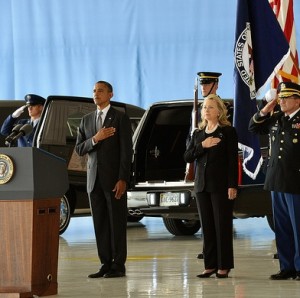OPINION: The dangers of Benghazi politicking
The Obama administration has entered dangerous territory by letting unnamed senior intelligence officials join the public fray over the Sept. 11 attack on the U.S. consulate in Benghazi.

The bodies of four slain Americans arrive at Joint Base Andrews outside Washington. Credit: U.S. State Department
The administration’s frustration at the media’s treatment of Benghazi is understandable. It used to take secret tapes or a source in a parking garage to allege a cover-up. Now all it takes is a TV segment and a Twitter account.
Allowing intelligence officials to rebut Republican talking points is not the right solution. The strategy threatens to bring down the protective wall erected between politics and the intelligence community after the intelligence abuses of the 1960s and ’70s. That wall took a hit in 2002 and 2003 when George Tenet let the Bush administration’s zest to invade Iraq color the community’s analytical processes.
The Obama administration risks damaging the wall further for little return. A few words from unnamed officials are unlikely to convince anyone of anything in today’s charged environment.
Careful readers will wonder why they should trust a prepared statement and timeline provided to news outlets but not posted on the public websites of the CIA, the Office of Director of National Intelligence or the White House, The comments also address only one aspect of the Benghazi controversy – whether the CIA delayed sending help to the consulate. Does this mean all other rumors of incompetence and cover-ups are true?
Perhaps most dangerous of all, the loosely attributed comments could inspire others to straighten out their bosses.
If you doubt that could happen, take a look at the epilogue of “No Easy Day,” the initially anonymous account of the Bin Laden killing by Matt Bissonnette, one of the Navy SEALs who fired the kill shots into Bin Laden’s convulsing chest.
“We always prided ourselves for being the quiet professionals, but the more I saw coverage of the raid, the more I wanted to set the record straight,” writes Bissonnette, then working under the pen name Mark Owen.
How could Bissonnette have the gall? Well, think back to the days after the raid. The White House gave background briefings to favored media outlets; CIA Director Leon Panetta and White House counterterrorism adviser John Brennan stood on separate stages and contradicted each other; clarifications were issued.
The result was a tangled mess, with no one sure whose words to trust. It was a lot like what we’re seeing in the Benghazi case.
There was another option available to the administration in both the Bin Laden and Benghazi cases.
The White House could have used the months and years preceding the raid to line up a retired prosecutor or investigator to quickly assembly an unclassified account in the event Bin Laden were apprehended. Bissonnette and others could have been interviewed, perhaps staving off publication of “No Easy Day” or at least making it a much less interesting read.
In the Benghazi case, something similar could have been done and might still be possible. The equivalent of a newspaper’s ombudsmen should be assigned to quickly assemble an unclassified account of what the administration knows and does not know about the attack and its circumstances.
Quickly releasing transparent, on-the-record information would be a radical departure from the typical Washington approach of dragging out official investigations for months or years.
It’s worth remembering President Obama came into office lambasting those who played “the same old Washington games” while “expecting different results.”
Whoever wins Tuesday will need an intelligence community that is trusted as nonpartisan. This is no time for Washington games, from either Democrats or Republicans.


